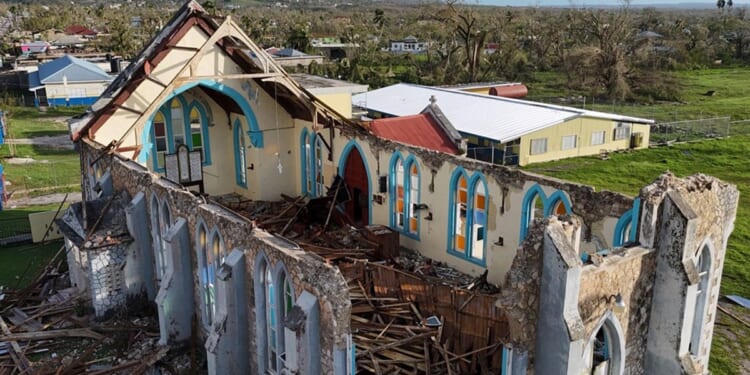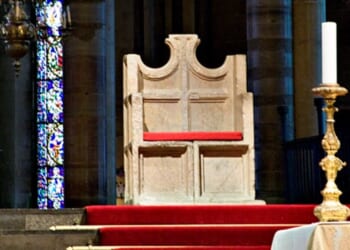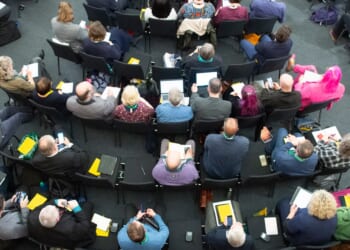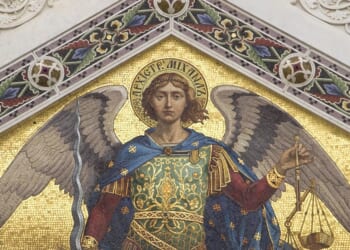HUNDREDS of churches are believed to have been destroyed across Jamaica, as Hurricane Melissa’s trail of devastation becomes evident.
Last week’s hurricane was the strongest ever to make landfall on the island, reaching a Category 5 storm with sustained winds at 185 mph (298 kmh).
At least 32 people were killed in Jamaica. In the widespread destruction in Haiti, 343 were killed. Two people died in the Dominican Republic. Cuba had flooding and landslides.
The hurricane knocked out power lines and communications; so the full scale of devastation has taken days to become apparent. People are desperately in need of clean drinking water and food, and field hospitals have been set up to treat the injured. About 6000 people are living in emergency shelters.
The diocese of Jamaica & the Cayman Islands has appealed for international donations of money, and local donations of food and other necessities. In a message on Facebook, the diocese urged supporters to “offer comfort and compassion: reach out to those grieving, injured or displaced with empathy and prayer, offering emotional and spiritual support as an act of love”.
The Bishop of Jamaica, the Rt Revd Leon Golding, said: “These are difficult times for all of us. However, I commend to you the words of Psalm 46, ‘God is our refuge and strength, a very present help in trouble.’”
The aid agency Samaritan’s Purse has set up its own field hospital in the south-western coastal town of Black River, which was flattened.
The charity has also been airlifting supplies to survivors. Edward Graham, the chief operating officer for Samaritan’s Purse and a son of the charity’s founder, Franklin Graham, said that the field hospital would help fill a gap in medical support after one of the island’s hospitals was destroyed and others sustained critical damage.
“Please pray for the people of Jamaica who are greatly suffering,” he posted on X. “The storm has brought devastating destruction to families and communities across Jamaica, and Samaritan’s Purse is committed to staying until the work is complete.
“Please pray for the people of Jamaica, that they would know they are not forgotten and that God loves them.”
St John’s, Black River, a historic church, was one of the many buildings destroyed in the town. The early-19th-century church was a national heritage site. Just the clock tower and part of one wall remain standing.
The founder of the Jamaica Colonial Heritage Society, Brett Ashmeade-Hawkins, has set up a crowdfunder for the church. He said: “The Church was filled with Early 19th Century marble wall monuments of great historical importance and also had elegant hand-carved Early 19th Century mahogany woodwork throughout. Tragically all of this has now been destroyed.”
The Jamaican daily The Gleaner reported that hundreds of churches had been destroyed, from wooden chapels to larger stone structures. Jamaica had 1600 churches. Ten per cent of Baptist churches had lost their roofs and many buildings are unstable and repair would cost millions, the general secretary of the Jamaica Baptist Union, the Revs Merlyn Hyde Riley told the paper.
“Our churches aren’t just worship centres,” she said. “They run schools, clinics, homework programmes, and kitchens that feed the homeless. With roofs gone and equipment destroyed, those ministries are temporarily halted. It’s heartbreaking, but we don’t believe this is permanent.”
St George’s Anglican Church, Westmoreland, has also lost its roof. The Revd Harley Perrin is due to retire this year after 47 years in ministry. He said: “I feel confident that the church can be rebuilt. I’ve done it over and over. But I’m an old man now. This time, it will be up to those who come after me to rebuild.”
The World Council of Churches (WCC) pledged support. In a message, the general secretary, the Revd Professor Jerry Pillay, and the WCC president from the Caribbean, the Revd Philip Silvin Wright said: “We know that Melissa also brings with it a test of our faith — in God, in life, in our ability to restore the common good and basic services for all.
“May your churches and their people find strength in the Lord to console the survivors, help your neighbours, and encourage hope among all your people.”

















